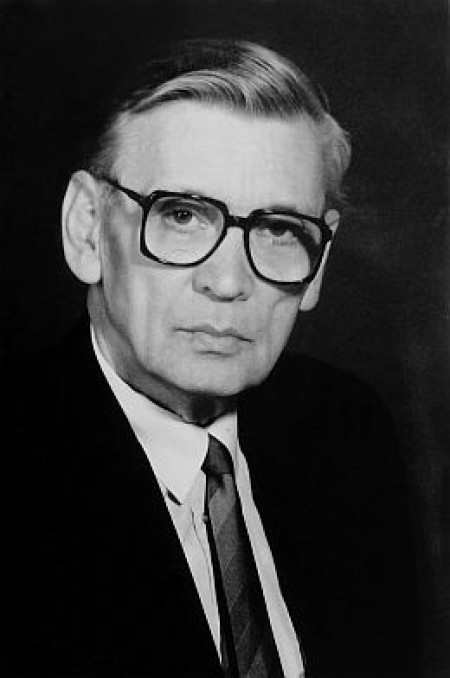
27 January 1930, Győr – 15 December 1994, Budapest
Highest level institutions of music education are ruled by artist-teachers world-wide. Compared to them music pedagogues whose lives lack the possibility of concert performances, the experience of stage routine, are in a less favorable situation. Nevertheless great teachers who are known exclusively by their students and not based on their teaching activities - done quasi incidentally - can be found everywhere. Usually they know something about the methodology of playing the instrument, about the physiological and psychological processes of developing musical skills for the learning of which their colleagues with an active performer's life hardly have the time. Regarding only the field of violin instruction there have been among them for example Jurij Jankelevich in Moscow or Ivan Galamian in New York recently – and Ferenc Halász, who taught for more than three decades at the Academy of Music belonged to them, as well.
He was born in 1930 at Győr. Following his studies at the local music school he was admitted to the Academy of Music in 1946 to the class of Ferenc Gábriel, then he graduated as a student of Ede Zathureczky in 1953. From the beginning he was attracted by the questions of violin instruction primarily. He climbed the career ladder: between 1954 and 1959 he was a teacher at the primary level in the sixth district and Újpest schools of the Music School Association of the Capital, from 1959 on he was getting to know the problems of music education at the secondary level in the Bartók Béla Secondary School of Music, and then between 1962 and 1994 the year of his death he was a professor at the Academy of Music. Though he did not become unfaithful to the younger generation either: while he was working intensively with the students committed early to professional musicianship at the School of Special Talents he was teaching continuously at the Conservatory, too of which he was the director -with one year interruption- between 1972 and 1981. There he placed the ideal of the unity of educated musicians and cultured people in the center of his endeavors besides creating conditions of seamless preparation for the musician career the reconciliation of the general and music studies.
He established his knowledge of the pedagogy of violin with Dezső Rados and Ágnes Rozgonyi, and built on that the experiences gained by the cooperation with the Moscow school from 1970 on, especially by his frequent consultations with Volodar Petrovich Bronin. In the last decade of his life his relationship to Loránd Fenyves - whom he found exceptionally balanced in the duality of the artistic and pedagogical activities - influenced him. The methodological knowledge uncompromisingly firm and easily transferable to the practice meant the basis of his teaching. He knew the physiological criteria of playing the violin to a unique deepness while he also knew the steps and processes exactly by which that can be learned. At short master classes he proved to be an unmatched diagnostician as he identified the playing problems of the students he worked with and advised such immediately active recipes by which he had a reputation as a real ‘wizard'. However his systematic teaching was known only by his students who could follow the gradual building up of their own violin playing through years and the layering of those really pertinent instructions they received for solving musical problems. Meanwhile they studied not only playing the violin with him, but much more: thinking.
Regarding the conditions in his home country it is not surprising that the Halász-classes could not be a genie training school consisting of selected talents exclusively. His students becoming soloists or gained recognition as chamber musicians who were ranked internationally in many cases could be listed, for example Mária Bálint, Pál Éder, András Ligeti, Gábor Takács Nagy or Vilmos Szabadi, though the fact that several of his students are members of all our significant orchestras who play a great role in maintaining the orchestral culture of the country is at least equally important. And that he did for the entire Hungarian violin education is even more significant, not only by the surveillance of methodology and supervised teaching but through the continuing education of teachers during which he drew attention - by connecting theoretical lectures and master classes - to the inseparable interconnections between these two fields.
He was a man of theoretical interest but also very practical-minded, who was always dealing mainly with the ability of applying knowledge. The appropriate methodology leads to the correct playing of the instrument and that is needed exclusively for finding the way to the right, unobstructed music making – as he claimed. He was not an advocate of authoritarian pedagogy still he owned great prestige, in which the respect for his knowledge were intertwined with the strong impact of his open-minded still almost conservatively consistent personality.
H. P.


